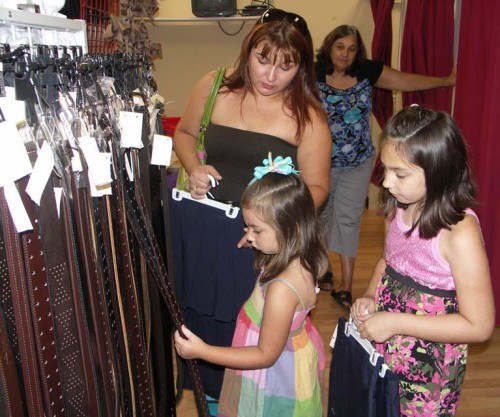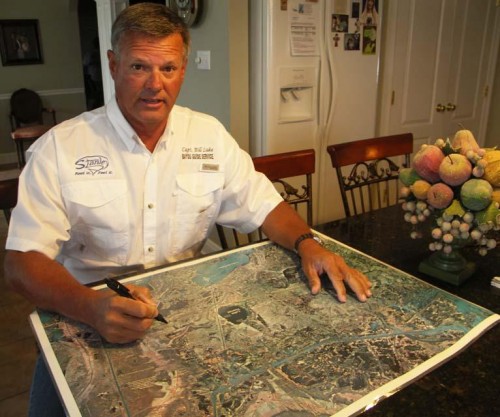
Superintendents name challenges for new school year
August 2, 2011100 Black Men unite for a 5K cause
August 4, 2011It’s been called the best kept secret in America, but 70 licensed recreational fishing captains in Terrebonne Parish are working to deliver the message that a $200 million segment of Louisiana’s tourism industry n more than $6 million locally n constitutes a big business catch for the region with room to grow.
Capt. Stu Scheer, owner of Cocodrie Inside Charters, has been in the industry since 1971, and in 2003 was inducted into the Louisiana Outdoor Hall of Fame. He noted this week that the state of Louisiana has 765 licensed charter guides both inland and offshore with approximately 90 percent of that number focused on inland waterways. The remainder are offshore and an undetermined segment tours both fresh and saltwater areas of coastal parishes.
“Terrebonne Parish recreational and charter fishing combined is approximately 95 percent of the tourist business both directly and indirectly,” Scheer said. “Of our tourist business, this parish ranks fourth in the state in total number of recreational fishing licenses sold, fourth in the number of registered boats and has approximately 6,000 recreational fishing camps.”
Charter fishing trips in Terrebonne Parish for 2009, the last year from which complete records are available, and prior to the BP oil spill, generated approximately $6 million and on an average 5,360 tours per three year block.
Some area guides came from other careers to add their business skills to this advancing industry. Capt. Bill Lake, owner of Bayou Guide Service, was a one-time Winn Dixie grocery store manager, but has been a full time charter fishing captain for 18 years.
Lake said that charter fishing in Terrebonne Parish continues to grow with each passing season. “I would say that my business has grown 30 percent over the previous year, every year since I got started,” he said. “Last year, because of the BP oil spill and the fact that the waters were closed and there were a lot of canceled trips, even with the canceled trips, we still were right at what we did the previous year.”
Lake is one fisherman who received compensation from the BP Gulf Coast Claims Facility and recovered approximately 80 percent of his 2010 losses. He said that the recovery money enabled him to keep his sole proprietorship business afloat. “That helped tremendously,” he said.
“This year has been a fantastic year of fishing,” Lake said. “We’ve caught huge numbers of speckled trout every day. We’re still catching red fish hand over fist.”
Scheer said one of the attractions to Louisiana for anglers is the relaxed limits in comparison to neighboring states. “We catch more fish per person per trip than any state in the nation,” he said. “Speckled trout is the No. 1 saltwater species sought down here. Our limit in Louisiana is 25 per person. But in Florida the limit is three per person and in Texas it is seven. Our limit on red fish is five, and in Texas and Florida it is one. That gives you an idea why people come here to fish.”
Many charter captains join efforts as a network of guides to boost the overall industry. “Don’t get me wrong,” Lake said. “Each individual guide pretty much has their own charter business. We’re all separate from each other, but we kind of sub-contract with each other. If you got a network then you can help each other and you know what is going on in different areas. It helps us all. That’s the way it works.”
While some guides, like Scheer and Lake, are full-time operators, others participate in charter fishing as a second business to other jobs.
The cost of charter fishing for a tourist generally covers the boat and guide, tackle, rods and reels for a day starting at approximately $700 per four customers depending on the guide and where the tour takes place. Lake said that he tells customers to bring their own food and drink. “The reason for that is they know what they want to drink. They know what they want to eat,” he said.
“Basically, all the customer needs is a fishing license,” Lake said. “If they go through us and get what is called a charter passenger license, it is only good if you are fishing with a licensed guide, but it is only $8.50 and it’s good for three days.” A standard Louisiana resident fishing license costs $15 for the year.
Fishing in the southern parts of the state typically requires fishing enthusiasts to purchase both a freshwater and a saltwater license, but a charter passenger license is good in either setting. “You’re covered with that license in freshwater, saltwater or both,” Lake said.
Being successful in the charter business requires spending time on the water, even without passengers. “You have to put your days in,” Lake said. “We spend a lot of time and energy locating fish and staying on fish every day, to be able to put our equipment out there. A lot of customers don’t realize how much effort and how much work is put in before that fishing tour. People are paying to catch fish. They want to catch fish. Unless you are on the water a lot to know the water and the seasonal changes, you won’t be successful.”
The Gulf States Marine Fisheries Commission, in conjunction with the National Oceanic and Atmospheric Administration, is currently researching the impact of charter fishing as an independent industry among Gulf States.
“In Louisiana alone, [charter fishing and related businesses] create 25,590 jobs,” GSMFC economist Alex Miller said. “And it brings $2.2 billion into the economy.”
Miller added that this study n results are to be released in 2012 n is timely for charter guides that fish the bayous, lakes and offshore areas of Terrebonne Parish. “The GSMFC’s principal objectives include the conservation, development and full utilization of fishery resources of the Gulf of Mexico in order to provide food, employment, income and recreation to the people of these United States,” he said.
“Terrebonne Parish is pleased to be the saltwater fishing capitol of the world,” said Terrebonne Parish President Michel Claudet as the parish prepared to launch an advertising campaign promoting charter fishing. The promotion is being paid for out of a $2 million contribution from BP.
“We believe that this is a way that we attract people from all over the state, the region and the nation,” Claudet said. “We have some of the best fishing in all of our areas, Dularge, Four Point, Dulac, Cocodrie, Montegut and Pointe aux Chenes. We have great charter fishing guides and people love the hospitality and food they have while they are here.”
“Charter fishing is huge for Terrebonne Parish,” Lake said. “People come here to fish. Then when they get here they do other things like go to museums, go on alligator tours and try the food.”
“I don’t think the people locally quite comprehend and understand how big recreational fishing is to Terrebonne Parish and the state of Louisiana,” Scheer said. “It is just my opinion, but I believe we have surpassed commercial fishing as the second biggest industry for this area behind oil and gas.”
The recreational charter fishing industry in Louisiana is relatively young according to Scheer and Lake. For as significant an economic contributor as it has become, little has been done until now to promote it on a large scale. “We are going to fix that,” Scheer said.
Those in the charter fishing business are ready for their secret to be known.
Capt. Bill Lake of Bayou Guide Service maps out his next charter fishing expedition. Charter fishing is identified as a primary draw for tourists to Terrebonne Parish. MIKE?NIXON?








